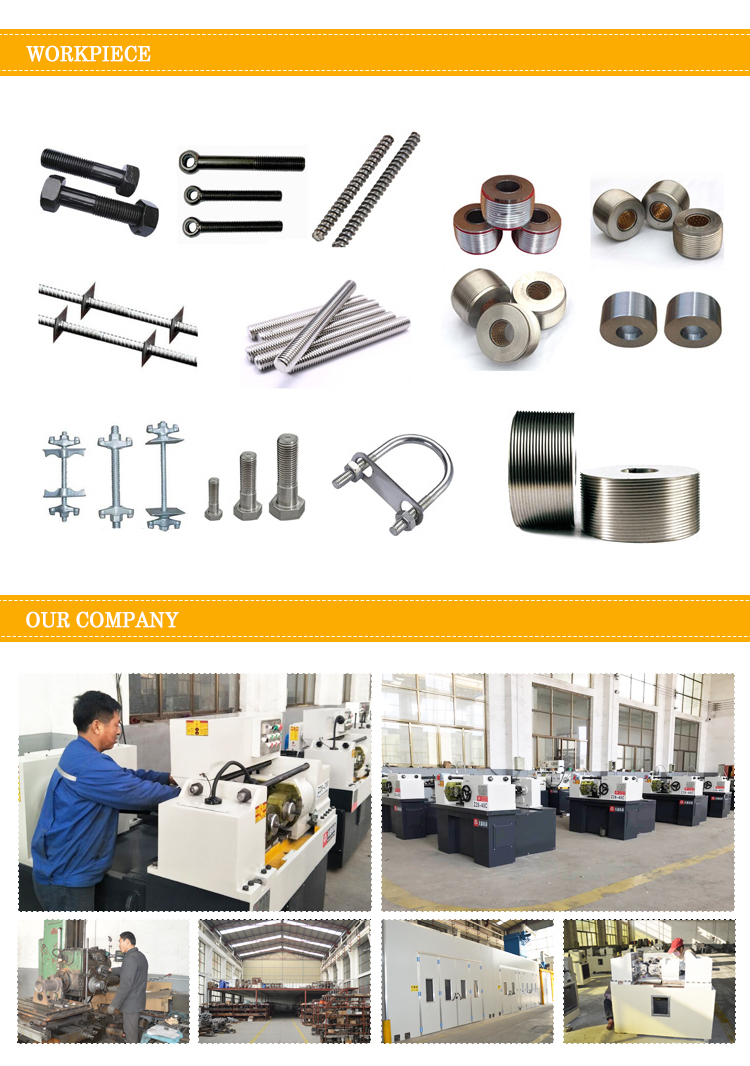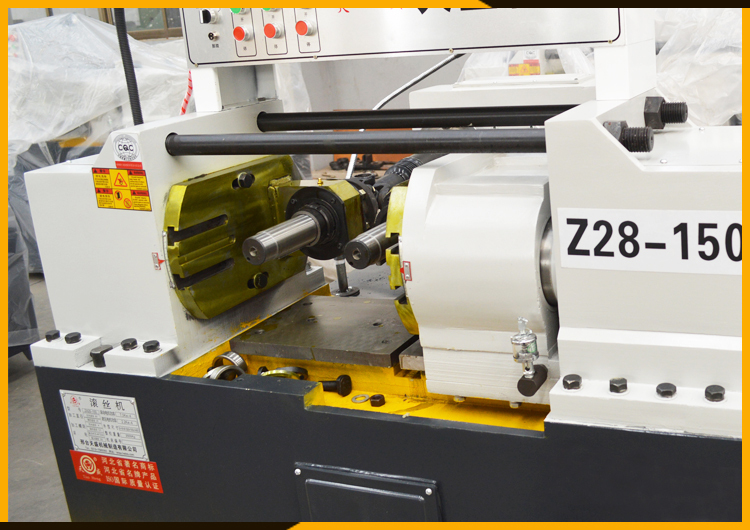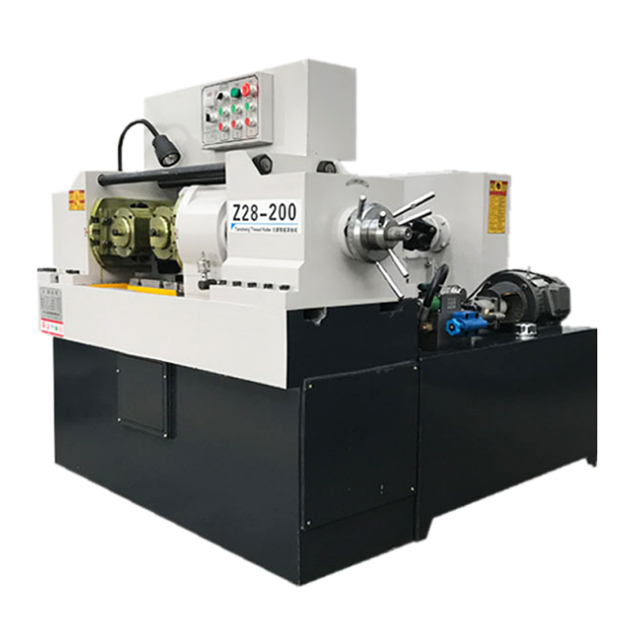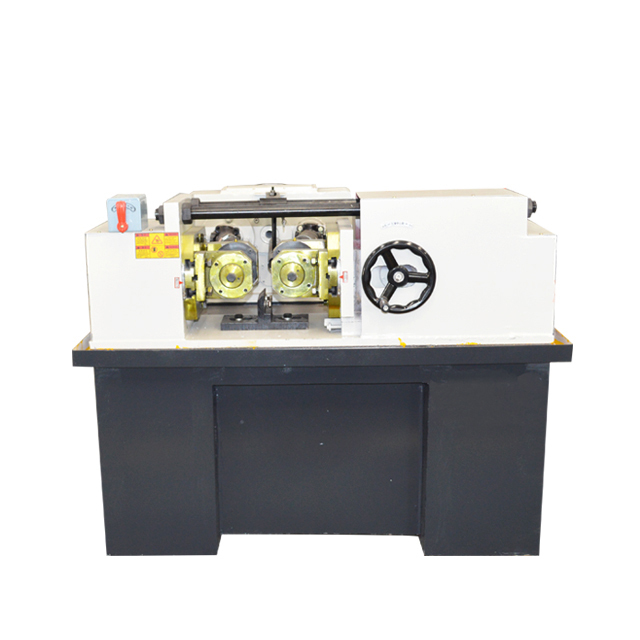huide
thread rolling machine for nails
Our target customers are all customers from all over world( Philippines,Central African Republic,Austria,Oman,Malta,Belgium,Brazil,North America, America, Africa and Oceania) who need our product.
We focus on customer focus--Identify customer needs with sincere and professional communication, Strictly control the production process to provide customers with high-quality products, professional technology and after-sales service to provide customers with the best-sales service and guarantee.
| Product name | thread rolling machine for nails |
| Keyword | machining data handbook thread rolling lubricant,cheap nail thread rolling machine,hydraulic thread rolling machine supplier,thread rolling machine manufacturer in taiwan,thread rolling machine price list,thread rolling machine videos,thread rolling machine manufacturer in ludhiana |
| Place of Origin | China |
| Production Capacity | 290~400/Per Min |
| Power | 2.2~6kw |
| Thread Dia(mm) | 2.0~4.0 |
| Thread Length(mm) | 7~50 |
| Feature | pipe nipple threading machine in its rolling pressure range of cold, the workpiece for thread, ruled, twill and other treatment; straight, helical and oblique spline gear rolling; straightening, reducing diameter, rolling and various forming rolling. |
| Dimensions | 1713mm*1813mm*1406mm, (Contact us for specific information to confirm) |
| Applicable Industries | Building Material Shops, etc. |
| Color | yellow or customized |
| Weight | 2689kg |
| Product Description | The machine has a safe and reliable electro-hydraulic execution and control system. Each work cycle can be selected in manual, semi-automatic and automatic ways. |
| terms of packing | enerally, we pack our goods in plywood cases. |
| terms of paymen | T/T 30% as deposit, and 70% balance against BL copy |
| Life span | 11 years (Contact us for specific information to confirm) |
| After-sale service | 12 months warrantly, man-made destory will be exception. |
| thread rolling machine for nails Advantage | We keep good quality and competitive price to ensure our customers benefit |
| Packing | 2276x2981x2474mm(Contact us for specific information to confirm) |
| OEM/ODM | Customization Service Provided |
| Sales country | All over the world for example:Philippines,Central African Republic,Austria,Oman,Malta,Belgium,Brazil |
| MOQ | 3pcs(Contact us for specific information to confirm) |
| Delivery time | 15-20 days for OEM, 5-7days for ready goods. |







thread rolling machine for nails
huide-machinery.as one of the most professional thread rolling machine for nails manufacturer has the advantages at:
We are the leader thread rolling machine supplier in China, also we have customers worldwide, such as America, Argentina, Brazil, Belarus, Bangladesh, Philippines,Central African Republic,Austria,Oman,Malta,Belgium,Brazil, and Italy.We are factory specializing in the manufacture and export of thread rolling machine for more than 20 years, all of the production we sale are at a very best price and high quality.
We take care of our product quality, any defect of the goods, we will take responsibility. You are risk-free.And we believe that the good quality products will can give us survival, so, we always offer the top quality products to our customers, to keep them have the competitiveness in there market.
thread rolling machine for nails services FAQs Guide
Are you looking for a quick review guide about thread rolling machine for nailsservices?
An ultimate FAQ buying guide is available to help you.This guide contains all the information about all the important facts, figures, and various processes regarding thread rolling machine for nails services.
Let’s continue!
2.Can a thread rolling machine for nails be Automated?
3.What safety precautions should be taken when operating a thread rolling machine for nails?
4.What does your factory produce ?
5.What Quality Control Measures are Used in thread rolling machine for nails Production?
6.What Types of Materials can be Used with a thread rolling machine for nails?
7.Can a thread rolling machine for nails handle both internal and external threads?
8.What is the Typical Lifespan of a thread rolling machine for nails?
9.Can a thread rolling machine for nails handle different thread types such as ACO, UNF, or NPT?
10.How Does the Size and Shape of Threads Created by a thread rolling machine for nails Affect Their Performance?
11.Is a thread rolling machine for nails Suitable for High Volume Production?
12.What are Some Common Defects in Threads Created by a thread rolling machine for nails?
13.Can a thread rolling machine for nails Create Internal Threads?
1.What is the Difference Between Annular and Circular Thread Rolling?
We have been working hard to improve service quality and meet customer needs.
Annular and circular thread rolling are two methods used to create threads on cylindrical parts. The main difference between these two methods lies in the shape of the thread produced.
Annular thread rolling is a process in which a cylindrical part is rotated between two dies, one of which has a thread-shaped groove. As the part is rotated, the dies move together, pressing the thread-shaped groove into the surface of the part, creating a helical thread. This method produces threads with a triangular cross-section, with rounded peaks and valleys.
On the other hand, circular thread rolling is a process in which a cylindrical part is rotated between two dies, both of which have thread-shaped grooves. As the part is rotated, the dies move together, pressing the thread-shaped grooves into the surface of the part, creating a helical thread. This method produces threads with a circular cross-section, with sharp peaks and valleys.
In summary, the main difference between annular and circular thread rolling is the shape of the thread produced. Annular thread rolling produces triangular threads, while circular thread rolling produces circular threads. The choice between these two methods depends on the specific requirements of the application and the desired thread shape.
2.Can a thread rolling machine for nails be Automated?
We focus on teamwork and communication to achieve common goals, We attach great importance to this detail.
Yes, a thread rolling machine can be automated. Automation can be achieved through the use of computer numerical control (CNC) technology, which allows for precise and repeatable control of the machine's movements and operations. This can greatly increase the efficiency and productivity of the thread rolling process, as well as reduce the potential for human error. Additionally, some thread rolling machines may also have built-in automation features such as automatic thread length measurement and adjustment, automatic lubrication systems, and automatic tool change capabilities.

3.What safety precautions should be taken when operating a thread rolling machine for nails?
We pay attention to user experience and product quality, and provide the best product quality and lowest production cost for cooperative customers.
1. Wear appropriate personal protective equipment (PPE) such as safety glasses, gloves, and earplugs.
2. Make sure the machine is properly grounded to prevent electrical hazards.
3. Keep the work area clean and free of clutter to avoid tripping hazards.
4. Familiarize yourself with the machine's operating manual and follow all safety instructions.
5. Do not wear loose clothing or jewelry that could get caught in the machine.
6. Always use the correct size and type of dies for the thread being rolled.
7. Do not touch the rotating parts of the machine while it is in operation.
8. Keep your hands and fingers away from the die area and feeding mechanism.
9. Do not attempt to adjust or repair the machine while it is running.
10. Use a push stick or other tool to feed the material into the machine to avoid hand injuries.
11. Do not overload the machine with excessive material.
12. Regularly inspect the machine for any signs of wear or damage and perform maintenance as needed.
13. If the machine malfunctions or makes unusual noises, stop the operation immediately and consult a qualified technician.
14. Always turn off the machine and disconnect the power before performing any maintenance or cleaning.
15. Train all operators on the safe operation of the machine and ensure they follow all safety precautions.
4.What does your factory produce ?
We produce and export all kinds of Reinforced Bar Thread Rolling Machine with butt welding. We also can design and develop automatic wire ring making machines with butt welding according to your requirements.

5.What Quality Control Measures are Used in thread rolling machine for nails Production?
1. Material Inspection: The first step in quality control is to inspect the raw materials used in the production of thread rolling machines. This includes checking the quality and specifications of the steel, bearings, gears, and other components.
2. Machine Calibration: Before starting the production process, the thread rolling machine is calibrated to ensure that it is functioning properly and producing accurate threads.
3. In-process Inspection: During the production process, regular inspections are carried out to check the dimensions, surface finish, and other critical parameters of the thread rolling machine.
4. Statistical Process Control (SPC): SPC is a method used to monitor and control the production process by collecting and analyzing data. This helps to identify any variations or defects in the production process and take corrective actions.
5. Final Inspection: Once the thread rolling machine is completed, a final inspection is carried out to ensure that it meets all the required specifications and standards.
6. Performance Testing: The thread rolling machine is tested for its performance by running it with different types of materials and thread sizes to ensure that it can produce accurate and consistent threads.
7. Quality Management System: Most manufacturers have a quality management system in place to ensure that all the processes and procedures are followed correctly and any issues are addressed promptly.
6.What Types of Materials can be Used with a thread rolling machine for nails?
We continue to invest in research and development and continue to launch innovative products.
1. Metal: Thread rolling machines are primarily used for rolling threads on metal materials such as steel, aluminum, brass, and copper. These materials are commonly used in industries such as automotive, aerospace, and construction.
2. Plastic: Some thread rolling machines are also capable of rolling threads on plastic materials such as nylon, PVC, and acrylic. These materials are commonly used in industries such as electronics, medical, and consumer goods.
3. Wood: Thread rolling machines can also be used to create threads on wooden materials such as hardwood and softwood. These threads are commonly used in furniture making and woodworking industries.
4. Composite materials: Thread rolling machines can also be used to roll threads on composite materials such as carbon fiber, fiberglass, and Kevlar. These materials are commonly used in industries such as aerospace, marine, and sports equipment.
5. Rubber: Some thread rolling machines are also capable of rolling threads on rubber materials such as silicone, neoprene, and EPDM. These materials are commonly used in industries such as automotive, construction, and medical.
6. Ceramic: Thread rolling machines can also be used to create threads on ceramic materials such as porcelain, clay, and glass. These materials are commonly used in industries such as pottery, construction, and electronics.
7. Other materials: Depending on the type and capabilities of the thread rolling machine, it may also be able to roll threads on other materials such as leather, paper, and fabric. These materials are commonly used in industries such as fashion, packaging, and upholstery.

7.Can a thread rolling machine for nails handle both internal and external threads?
We focus on our customers' needs and strive to meet their expectations, so we take this very seriously.
Yes, some thread rolling machines are designed to handle both internal and external threads. These machines have different sets of dies and adjustments to accommodate the different types of threads. However, some machines may only be able to handle either internal or external threads, so it is important to check the specifications of the specific machine.
8.What is the Typical Lifespan of a thread rolling machine for nails?
The typical lifespan of a thread rolling machine can vary depending on several factors such as usage, maintenance, and quality of the machine. However, on average, a thread rolling machine can last for 10-15 years with proper care and maintenance. Some high-quality machines can even last for 20-25 years. Regular maintenance and timely repairs can also extend the lifespan of a thread rolling machine.

9.Can a thread rolling machine for nails handle different thread types such as ACO, UNF, or NPT?
Our mission is to provide customers with the best solutions for thread rolling machine for nails.
Yes, a thread rolling machine can handle different thread types such as ACO, UNF, or NPT. These machines are designed to be versatile and can be adjusted to produce different thread types by changing the dies or adjusting the machine settings. However, it is important to note that some thread rolling machines may be specifically designed for certain thread types, so it is important to check the machine's capabilities before use.
10.How Does the Size and Shape of Threads Created by a thread rolling machine for nails Affect Their Performance?
The size and shape of threads created by a thread rolling machine can greatly affect their performance in various ways. Some of the key factors that are influenced by the size and shape of threads include strength, durability, and compatibility with other components.
1. Strength: The size and shape of threads play a crucial role in determining their strength. Threads with larger diameters and deeper crests tend to be stronger and more resistant to shear forces. This is because they have a larger cross-sectional area, which allows them to distribute the load more evenly and withstand higher levels of stress.
2. Durability: The size and shape of threads also affect their durability. Threads with larger diameters and deeper crests are less prone to wear and tear, as they have a larger surface area in contact with the mating component. This reduces the pressure on individual threads and helps to distribute the load more evenly, thereby increasing their lifespan.
3. Compatibility: The size and shape of threads also determine their compatibility with other components. Threads that are too large or too small may not fit properly with the mating component, leading to issues such as thread stripping or loosening. Additionally, threads with irregular shapes or poor surface finish may not provide a tight and secure fit, which can affect the overall performance of the assembly.
4. Thread engagement: The size and shape of threads also affect the amount of thread engagement, which is the length of the thread that is in contact with the mating component. Threads with larger diameters and deeper crests have a longer thread engagement, which provides a stronger and more secure connection between the components.
In conclusion, the size and shape of threads created by a thread rolling machine can have a significant impact on their performance. It is important to carefully consider these factors when designing and manufacturing threaded components to ensure optimal strength, durability, and compatibility.

11.Is a thread rolling machine for nails Suitable for High Volume Production?
We have a professional team that is committed to the innovation and development of thread rolling machine for nails.
Yes, a thread rolling machine is suitable for high volume production. Thread rolling machines are designed to efficiently and accurately produce threads on a large scale. They are capable of producing threads at a much faster rate than traditional methods such as cutting or grinding. Additionally, thread rolling machines have a longer tool life and require less maintenance, making them ideal for high volume production.
12.What are Some Common Defects in Threads Created by a thread rolling machine for nails?
1. Incomplete Threads: This is a common defect where the thread is not fully formed or is missing in certain areas. This can be caused by improper alignment of the thread rolling machine or worn out dies.
2. Oversized Threads: This defect occurs when the thread is larger than the specified size. It can be caused by excessive pressure or incorrect die settings.
3. Undersized Threads: This is the opposite of oversized threads, where the thread is smaller than the specified size. It can be caused by insufficient pressure or worn out dies.
4. Tapered Threads: Tapered threads have a gradual change in diameter along the length of the thread. This can be caused by misalignment of the dies or uneven pressure during the rolling process.
5. Misaligned Threads: This defect occurs when the threads are not straight and parallel to each other. It can be caused by misalignment of the dies or improper setup of the machine.
6. Thread Flaking: Thread flaking is when small pieces of the thread break off, resulting in a rough and uneven surface. This can be caused by worn out or damaged dies.
7. Thread Cracks: Cracks in the thread can occur due to excessive pressure or improper die settings. This defect can weaken the thread and lead to failure under stress.
8. Thread Galling: Galling is a form of wear that occurs when two surfaces rub against each other. It can cause the thread to seize up and become difficult to turn.
9. Thread Stripping: This defect occurs when the thread is stripped or torn off the surface of the material. It can be caused by excessive pressure or incorrect die settings.
10. Thread Runout: Thread runout is when the thread is not concentric with the axis of the material. This can be caused by misalignment of the dies or uneven pressure during the rolling process.

13.Can a thread rolling machine for nails Create Internal Threads?
We have rich industry experience and professional knowledge, and have strong competitiveness in the market.
Yes, a thread rolling machine can create internal threads. This process is known as internal thread rolling and it involves using a set of dies to form the threads on the inside of a cylindrical workpiece. This method is commonly used for creating threads on nuts, bolts, and other fasteners. Internal thread rolling is a faster and more efficient process compared to traditional methods such as tapping or cutting, and it also produces stronger and more precise threads.
- Place of Origin:
- Video outgoing-inspection:
- Machinery Test Report:
- Marketing Type:
- Warranty of core components:
- Core Components:
- Key Selling Points:
- Applicable Industries:
- Application:
- Condition:
- Production Capacity:
- Voltage:





















